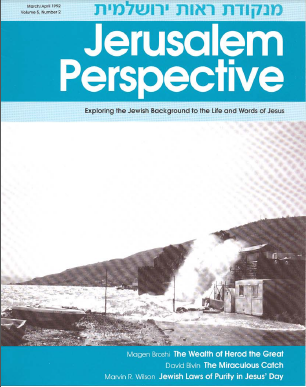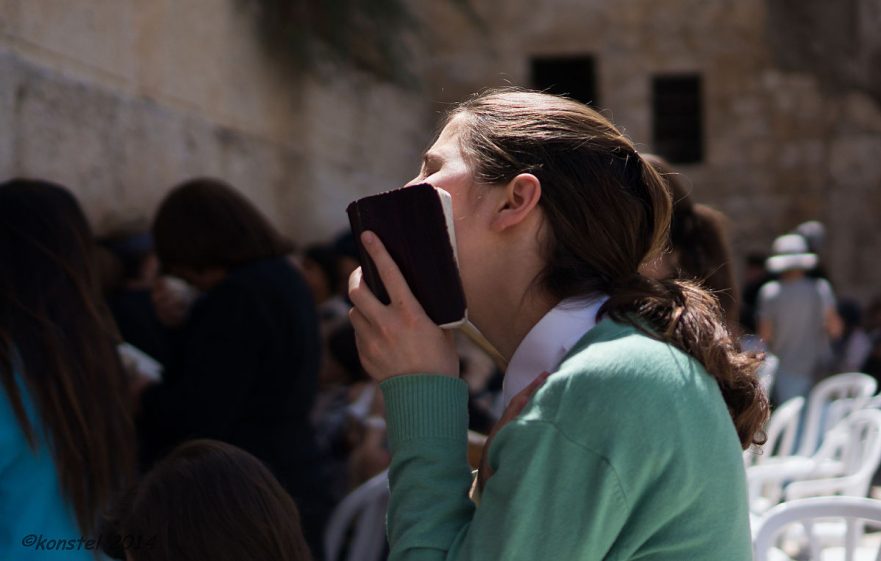This article is one of a six-part series entitled “Rabbinic Parallels.”
Revised: 15-Nov-2012The prayer that Jesus taught his disciples (Matt. 6:9-13; Luke 11:2-4) is viewed by Christians as a model prayer. It is even sometimes suggested that since the Lord’s Prayer can easily be prayed in about half a minute, prayers should be kept to that length. A little Jewish background provides an important perspective on the Lord’s Prayer and removes the notion that all prayers should be short.
Central Prayer
The central prayer in Jewish life and liturgy is known by a number of names: שְׁמוֹנֶה עֶשְׂרֵה (shemōneh ‘esrēh, “eighteen”), since it originally consisted of eighteen benedictions; עֲמִידָה (‘amidāh, “standing”), because it is said standing; or simply תְּפִלָּה (tefilāh, “prayer”), the prayer par excellence. It is very ancient, its final version dating from around 90-100 A.D. when a nineteenth benediction was added. (For a new translation of the Amidah prayer, see my “The Amidah Prayer.”)
This prayer is the essential part of the morning, afternoon and evening weekday services in the synagogue. It is said first in a whisper by the worshipers and then recited aloud by the reader. The prayer is composed of three opening benedictions of praise, which include “We will hallow your name in the world as it is hallowed in the highest heavens”; thirteen petitions including petitions for wisdom, healing, forgiveness, deliverance from want and affliction, and for the sending of the Messiah, “the branch of David”; and three concluding benedictions, which include thanksgiving to the “rock of our lives and shield of our salvation” whose “miracles are daily with us,” whose “wonders and benefits occur evening, morning and noon,” and whose “mercies and kindnesses never cease.” A person who is fluent in Hebrew can pray this prayer in about five minutes.
Every Jew is religiously obligated to pray the Eighteen Benedictions daily. Rabban Gamaliel said: “One must say the Eighteen every day” (Mishnah, Berachot 4:3). In times of emergency, however, this obligation is fulfilled by praying a shortened form of the Eighteen:
Rabbi Yehoshua says: “If one is traveling in a dangerous place, he says a short prayer, namely, ‘O Lord, save your people the remnant of Israel; in every time of crisis may their needs not be lost sight of by you. Blessed are you, O Lord, who answers prayer.’” (Mishnah, Berachot 4:4)
Abbreviated Prayers
The Babylonian Talmud, Berachot 29b explains that “a dangerous place” is “a place infested with wild animals or bands of robbers” and provides additional examples of abbreviated prayers:
Rabbi Eliezer [a younger contemporary of Jesus] says: “May your will be done in heaven above, grant peace of mind to those who fear you [on earth] below, and do what seems best to you. Blessed are you, O Lord, who answers prayer.”
Note the phrases “your will be done” and “in heaven above…[on earth] below” as in the Lord’s Prayer. Also note the parallel between “grant peace of mind” in the prayer Eliezer taught and “deliver us from evil” in the Lord’s Prayer.
Rabbi Yehoshua says: “Hear the supplication of your people Israel and quickly fulfill their request. Blessed are you, O Lord, who answers prayer.”
Rabbi Eleazar son of Rabbi Zadok says: “Hear the cry of your people Israel and quickly fulfill their request. Blessed are you, O Lord, who answers prayer.”
Other sages say: “The needs of your people Israel are many but they do not know how to ask for their needs. May it be your will, O Lord our God, to sustain each and every one and to supply each person what is needed. Blessed are you, O Lord, who answers prayer.”
The petitions for God’s provision for livelihood and his supply of what is needed are strongly reminiscent of the request for “daily bread” in the Lord’s Prayer.
The sages taught their disciples abbreviated versions of the Eighteen Benedictions such as those above, and it seems likely that Jesus similarly gave his disciples a prayer for occasions when there was not time to say the full form of the prayer. Far from being proof that customarily one should pray very brief prayers, the Lord’s Prayer points us to the Eighteen. It can be assumed that in normal times Jesus and his disciples prayed daily the much longer “Eighteen.”
| The featured image for this article is a photograph of a woman praying at the Western Wall in Jerusalem. Photographed by לנה קונסטנטינובה. Image courtesy of Wikimedia Commons. |
To read the next article in the Rabbinic Parallels series, click here.

Paid Content
Premium Members and Friends of JP must be logged in to access this content: Login
If you do not have a paid subscription, please consider registering as a Premium Member starting at $10/month (paid monthly) or only $5/month (paid annually): Register
One Time Purchase Rather Than Membership
Rather than purchasing a membership subscription, you may purchase access to this single page for $1.99 USD. To purchase access we strongly encourage users to first register for a free account with JP (Register), which will make the process of accessing your purchase much simpler. Once you have registered you may login and purchase access to this page at this link:

































































































Comments 4
Thank you for introducing the Amidah prayer as a possible background for the shorter, “Lord’s prayer.” I have a few further questions about the “Lord’s Prayer.”
First, in Matthew 6:5, Jesus is introducing his approach to prayer just preceding his recitation of the “Lord’s Prayer” to his disciples. He says, speaking of certain others, “for they love in the synagogues… [to] stand and pray …” ( ὅτι φιλοῦσιν ἐν ταῖς συναγωγαῖς… ἑστῶτες προσεύχεσθαι). Could this ‘to pray standing’ or ‘stand and pray’ as the NASB has it, be a hint at the practice of saying the Shemoneh Esrei of the Amidah in the synagogue or on the street corner? After all, it takes a few minutes standing and a lot of words to get through those eighteen petitions.
Secondly, Matthew’s longer ending of the Lord’s Prayer, (Matthew 6:13) containing the attribution of God’s glory is not included in Luke (Luke 11:4) and is no longer included in the most recent editions of the Greek critical texts, but claiming that this was as later addition. However, I recently came across 1 Chronicles 29:11 where David is enumerating all of the provisions he has made ready for the construction of the Temple by Solomon with praises and blessings to Adonai, (1 Chronicles 29:11)
“Yours, O LORD, is the greatness and the power and the glory and the splendor and the majesty, everything that is in the heavens and on the earth is Yours; Yours is the kingdom, O LORD, and You are exalted as head over all.”
It jumps out to me that this is strikingly similar to the Lord’s Prayer ending attribution of Glory,
“For yours is the kingdom and the power and the glory, forever…”
Therefore, I am wondering whether JP has any discussion about this final part of the Lord’s Prayer? Could it be an authentic ending original to Jesus? Or, could it be that there were several versions of the Lord’s Prayer which Jesus himself taught his disciples in circulation during his 3 1/2 years of ministry?
Thirdly, when analyzing the Lord’s Prayer it appears that there are five literary sub-units, consisting of five parallelisms, as follows.
1. Acknowledging and Sanctifying Adonai’s name
Our Father in the heavens
May your name be sanctified.
2. Bringing Adonai’s rule to earth
May your kingdom come,
May your will be done
As in heaven, so on earth.
3. Petitioning and trusting in Adonai’s provision
Give us today
the bread that is needed;
4. Petitioning God’s love for us, Our love for our neighbor
Forgive us our debts
As we forgive our debtors.
5. Petition for deliverance from the trial
Do not let us fall into the grasp of trial;
Rather, save us from [the] evil.
So, my inquiry is, in these five literary elements, is Yeshua making a midrash on certain verses in Torah or elsewhere in Psalms or Prophets? If so, does JP have any commentary on this?
Thank you in advance for your reply.
David
Shalom David!
The LOY reconstruction of the Lord’s Prayer with accompanying commentary will be released very soon. In the commentary Bivin and Tilton discuss the prayer’s relationship to the Amidah, the doxology (“For thine is the kingdom and the power and the glory,” etc.), and the structure of the prayer, and much more besides. Stay tuned!
This is rather disappointing, being so short. I’m doing research on the Amidah and also a translation for local use in South Africa and found another article pointing to this document, specifically pages 16 and 17. I was really expecting more, especially after having to pay for an article 24 years old!
Dear Zentie,
Sorry you were misled by the page numbers from the print version of the magazine. The citation referring you to pages 16-17 did not intend to indicate that the article was 17+ pages long, but that the article appeared on two pages (16 and 17) of the JP magazine (issue #37). You’ll find David Bivin’s translation of the Eighteen Benedictions at this link: The Amidah Prayer.
I also recommend the following article on the Amidah and it’s relationship to the Lord’s Prayer (not on our site):
Peter J. Tomson, “The Lord’s Prayer (Didache 8) at the Faultline of Judaism and Chrisitianity,” in The Didache: A Missing Piece of the Puzzle in Early Christianity (ed. Jonathan Draper; Atlanta: Society of Biblical Literature, 2015), 165-187.